Your baby’s third month is a time of amazing progress and development, as they become more physically and socially active and interactive.Your baby develops stronger and faster every day and learns more, achieving many milestones that demonstrate their physicality (motor development), sensory perceptiveness, and sociability. This article discusses some important developmental stages that your baby may achieve in the third month and how you can facilitate his or her progress.
Here are some of the growth and developmental milestones your 3-month-old may reach:
3 Month Old Baby Physical Development Milestones
The main physical development of your baby depends on the growth in muscle strength and coordination; with this, they develop their moving capacity to explore. Some of the physical milestones that your baby may achieve in the third month include:
Movement
Your infant may be able to roll over in two directions, from its back onto its stomach, and vice versa, and your assistance might sometimes be needed for rolling out from one position.
Your baby may also reach out to objects with more reason and choice ; one moment holding them in his hands and bringing them to the mouth Your infant may also exhibit an improved affinity for hands and feet, finger sucking, or toe cleaving.
Sensory
In the 3 months, hand-eye coordination and visual awareness of your baby get enhanced; it lets them grab, shake, banging, or drop off the toys . Your infant may also become aware of his or her surroundings and look around more critically at different objects, colors, and themes that will begin to take shape.
Recognition of familiar faces is also possible. Your baby may smile or coo at the sight of some relatives, especially when they come to visit a newborn.
Feeding
In the third month, you may observe your baby’s feeding patterns becoming regular and predictable because, more than likely, they can hold longer gaps in between feedings besides taking up larger amounts of milk per bow.
Your baby can be fed every 4 to 6 hours and intake about 6 to 8 ounces of breastmilk per feed.
Your child would also be ready to try out solid foods such as pureed fruits, vegetables, or cereals and may show some of the readiness signs, like sitting with a support, showing interest in your food choices, and opening up his or her mouth when offered a spoon. You can introduce such foods gradually and attentively, monitoring any possible hypersensitivity symptoms such as hives, vomiting, or diarrhea.
Sleep
Your baby’s sleep patterns might straighten in the third month since he must be sleeping longer hours at night and also have a structured daytime schedule. Your baby may sleep about 10 to 12 hours at night, but he or she can wake up once or twice during the same period for feeding and changing.
Your baby may also sleep anywhere between 4 and 6 hours during the day, with two or three nap lengths varying. You can help your infant sleep better through the development of a nighttime routine, such as reading or singing to him or her just before bed and tucking them in when they are still.
Alternatively, you can also restrict the swaddling, as your baby may have gained the ability to roll over and might need more freedom of movement.
3 Month Old Baby Social and emotional Development Milestones
Your baby’s social and emotional development in the third month is mostly due to awareness and curiosity inspiring them to show feelings. Some of the social and emotional milestones that your baby may achieve in the third month include:
Smiling and vocalizations
Your baby may start smiling more frequently and to a greater extent at the age of three months; he or she can be able to show social smiles that are directed towards you or other people, unlike reflexes caused by gas.
Reaction to name is another milestone that your baby can attain and shows recognition by turning their head or eye in the direction of you when being called. Your baby can also exhibit emotions through sounds, which may include cooing, gurgling, and babbling, among other things, in the expression of feelings such as happiness, excitement, or frustration.
Interaction
In the third month, your baby can interact better with you and others, as it will be more active in both playing and having fun. Another game that your infant will probably like is ‘peek-a-boo’, which fosters in the child memory and understanding of object permanence—when and how things persist even outside their awareness.
Your baby may also enjoy playing with toys, such as rattles, soft books, or mirrors, and may explore them with their hands, mouth, and eyes. Your baby may also show preferences for familiar faces, such as yours, and may reach for them or try to touch them.
Attachment
The third month is characterized by the development of a strong attachment to you and other caregivers, as your baby may begin developing certain signs such as trust and familiarity. When they feel unsatisfied, scared, or want to sleep, your baby may cling to you, hoping for comforts and reassurances from you, which might sometimes calm them into serenity by holding, talking, or singing.
Your baby may as well develop separation anxiety—the fear of being away from her or other caregivers. In such a case, she’ll cry in your absence, even for just 2 minutes, and stop when you are present near her.
To assist your baby in overcoming separation anxiety, you can encourage them by saying goodbye, reassuring them that they will eventually return, and leaving their company with someone who is known to be trusted.
Conclusion
In conclusion, your baby’s third month is a time of amazing and exciting development, as they achieve many milestones that reflect their physical, sensory, and social abilities. Your baby is developing and learning every day, and you can support and nurture their development by providing them with a loving, stimulating, and safe environment. Your baby’s third month is also a time of joy and fun for you, as you interact with your baby and enjoy their smiles, laughter, and cuddles.
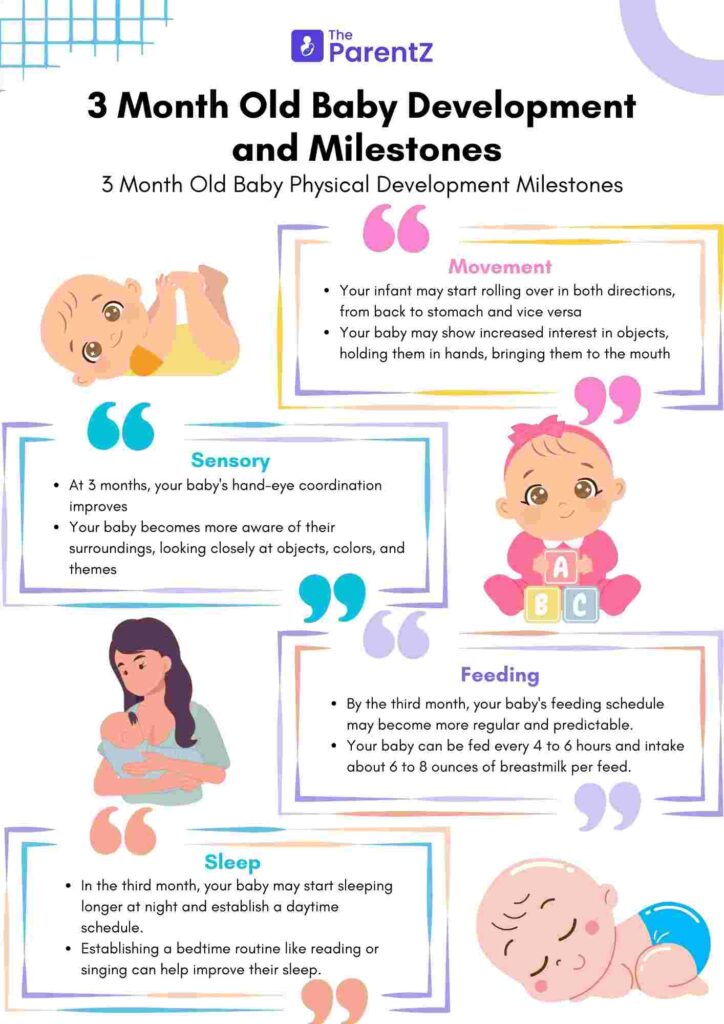
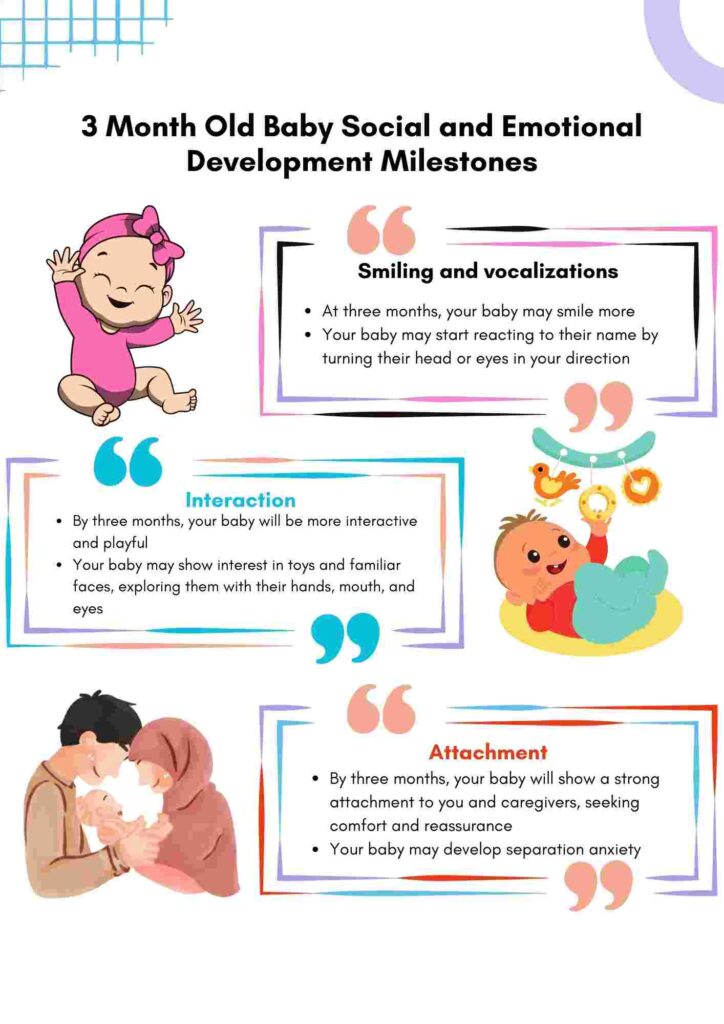
Curious about your 4-month-old’s next milestones? Discover more in our article on 4 Month Old Development Milestones.
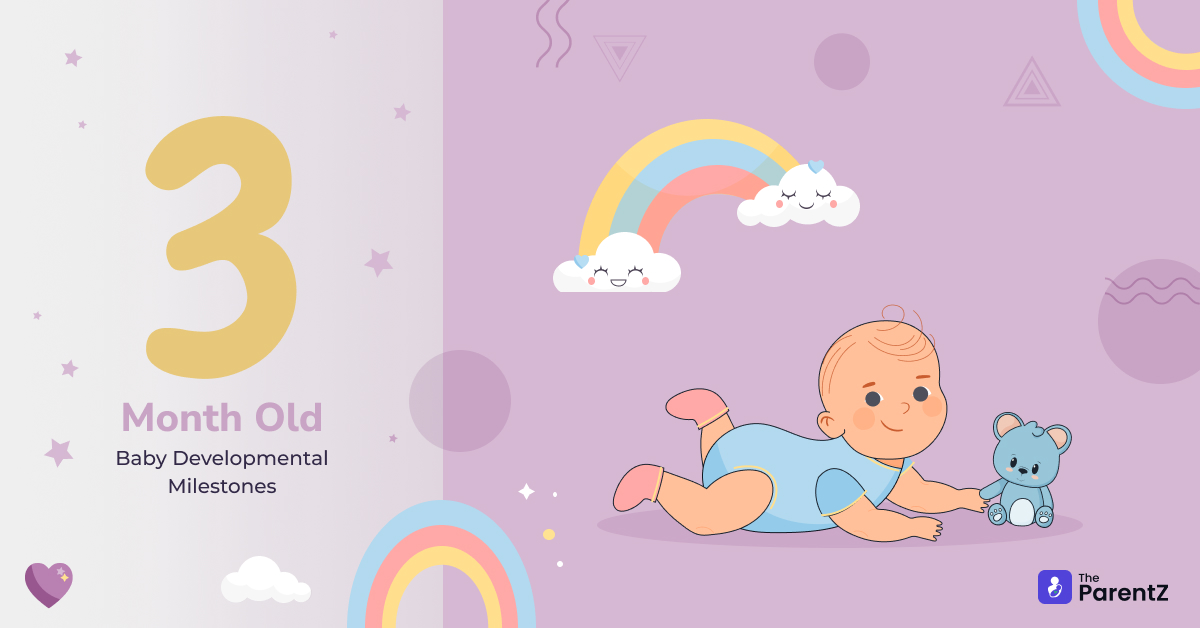


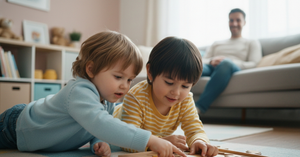
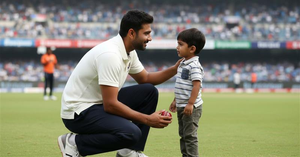



Be the first one to comment on this story.